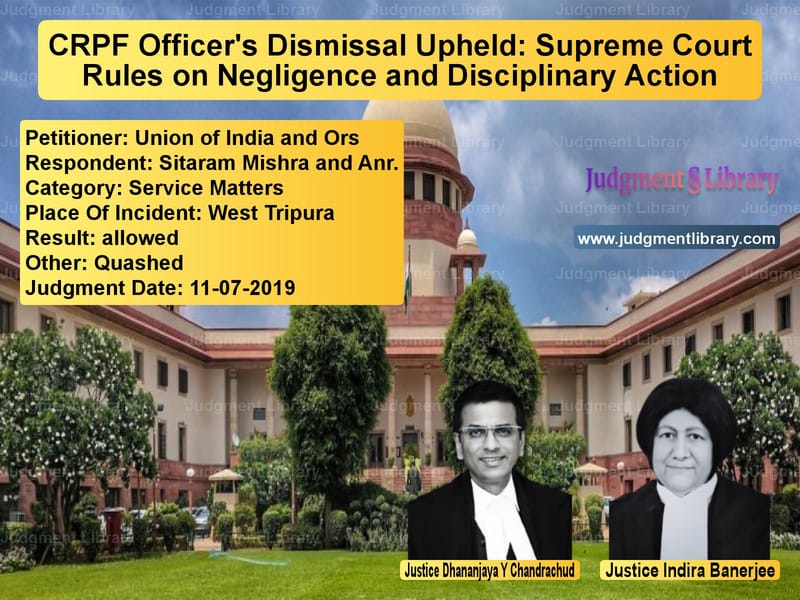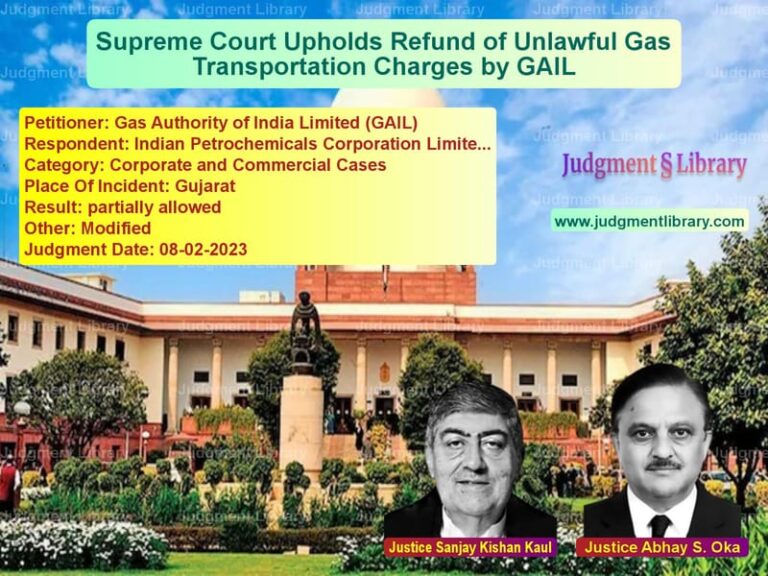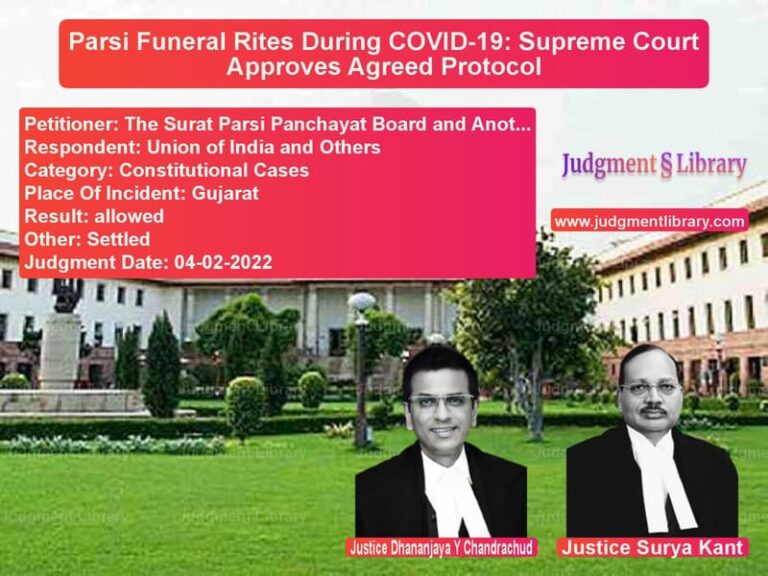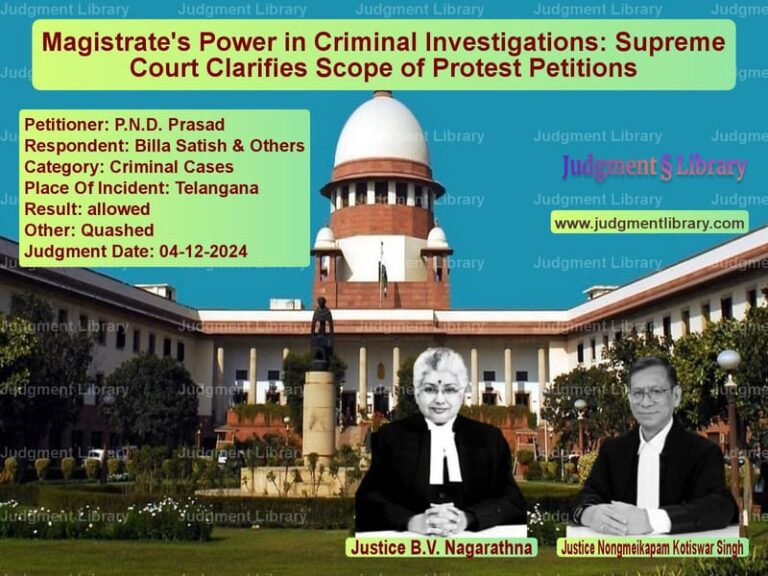CRPF Officer’s Dismissal Upheld: Supreme Court Rules on Negligence and Disciplinary Action
The case of Union of India and Ors v. Sitaram Mishra and Anr. is a significant ruling concerning the dismissal of a CRPF officer for negligence. The Supreme Court upheld the disciplinary action taken against the officer, reinforcing the principle that disciplinary proceedings operate independently of criminal trials. The case revolved around the unintentional firing of a weapon by the respondent, which resulted in the death of a fellow constable.
Background of the Case
The respondent, Sitaram Mishra, was enlisted as a constable in the CRPF on September 20, 1971, and was serving as a Head Constable in the 41st Battalion in West Tripura in 1998. On February 18, 1998, while cleaning his loaded 9MM carbine in the barracks, he accidentally discharged eight rounds, one of which fatally struck a fellow constable.
A First Information Report (FIR) was lodged, and a disciplinary proceeding was initiated under Section 11(1) of the CRPF Act, 1949. The charge against him read as follows:
“That No.710170325 HC Sita Ram Mishra, while serving as a Head Constable (GD) in ‘B’ Coy, was negligent in his capacity as a member of the Force under Section 11(1) of the CRPF Act, 1949, punishable under Rule 27(a) of CRPF Rules, 1955, in that he, on 18.02.1998 at about 0945 hours, started cleaning the barrel of his loaded 9 MM Carbine carelessly without removing its magazine on his bed. In this process of cleaning, 08 rounds got fired automatically, and one of these bullets hit No.901310271 Ct. Sailesh Kumar Tiwari, who was present there in the barrack. No.901310271 Ct. Sailesh Kumar Tiwari subsequently succumbed to his injuries at about 1020 hours the same day in Civil Hospital, Jirania, Agartala.”
Legal Proceedings
Disciplinary Action and Trial
- A disciplinary inquiry was conducted, and on March 12, 1999, the respondent was found guilty of negligence.
- As a result, he was dismissed from service under Section 11(1) of the CRPF Act, 1949.
- The respondent also faced a criminal trial under Section 304 IPC (culpable homicide not amounting to murder) but was acquitted by the Judicial Magistrate on January 5, 2002.
High Court’s Ruling
After being acquitted, the respondent challenged his dismissal through a writ petition under Article 226 of the Constitution. The Single Judge dismissed the petition, upholding the disciplinary action. However, the Division Bench of the High Court overturned the decision, holding that:
- The disciplinary findings were not supported by evidence.
- The respondent had already been acquitted in the criminal case, making the departmental action unsustainable.
- Since he had retired, he should be treated as in service until superannuation and paid full back wages.
Supreme Court’s Analysis
Key Observations
- The Court reaffirmed that departmental inquiries operate under the standard of preponderance of probabilities, unlike criminal cases, which require proof beyond a reasonable doubt.
- The disciplinary proceedings focused on whether the respondent had violated service rules, rather than criminal intent.
- The respondent’s own statement indicated negligence:
“When I was about to go outside to see my luggage, I fitted the magazine of my Carbine, and JAB MAINE MAGAZINE PAR HATH MARA TO CARBINE SE FIRE HONE LAGA.”
Judgment of the Supreme Court
The Court ruled:
“The High Court was manifestly in error in interfering with the findings of the disciplinary inquiry, particularly when a learned Single Judge had found no irregularity in the inquiry. The punishment of dismissal is not disproportionate to the misconduct proved.”
It further stated:
“The acquittal in the criminal trial cannot operate ipso facto as a ground for vitiating the finding of misconduct in the disciplinary proceedings.”
Final Verdict
The Supreme Court set aside the High Court’s ruling and upheld the respondent’s dismissal:
“For the above reasons, we allow the appeal and set aside the impugned judgment and order of the Division Bench of the High Court dated 14 December 2007.”
Significance of the Judgment
This ruling clarifies several important principles:
- Departmental Inquiries vs. Criminal Trials: A departmental inquiry follows different evidentiary standards and can proceed independently of a criminal trial.
- Negligence as a Ground for Dismissal: Even if an act is unintentional, negligence that results in harm can warrant dismissal from service.
- Judicial Review Limitations: Courts should not re-evaluate evidence in disciplinary proceedings unless there is a clear absence of evidence.
Conclusion
The Supreme Court’s ruling in Union of India v. Sitaram Mishra reinforces the importance of discipline in the armed forces and paramilitary services. The judgment upholds the principle that negligence leading to fatal consequences is a serious offense and can lead to dismissal, irrespective of criminal prosecution outcomes. This case serves as an essential precedent for employment law and disciplinary actions in public services.
Petitioner Name: Union of India and Ors.Respondent Name: Sitaram Mishra and Anr..Judgment By: Justice Dhananjaya Y Chandrachud, Justice Indira Banerjee.Place Of Incident: West Tripura.Judgment Date: 11-07-2019.
Don’t miss out on the full details! Download the complete judgment in PDF format below and gain valuable insights instantly!
Download Judgment: Union of India and O vs Sitaram Mishra and A Supreme Court of India Judgment Dated 11-07-2019.pdf
Direct Downlaod Judgment: Direct downlaod this Judgment
See all petitions in Employment Disputes
See all petitions in Termination Cases
See all petitions in Disciplinary Proceedings
See all petitions in Judgment by Dhananjaya Y Chandrachud
See all petitions in Judgment by Indira Banerjee
See all petitions in allowed
See all petitions in Quashed
See all petitions in supreme court of India judgments July 2019
See all petitions in 2019 judgments
See all posts in Service Matters Category
See all allowed petitions in Service Matters Category
See all Dismissed petitions in Service Matters Category
See all partially allowed petitions in Service Matters Category







